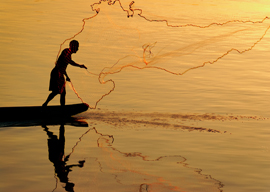
July 05, 2012

The hippies, or at least that minority of them who deigned to take an interest in worldly affairs, would tell you that Laos was run by a clique of Chinese drug lords in cahoots with the CIA. This seems entirely possible. I have never been in a place where drugs were so easily available. You could buy a big plastic bag full of good-quality weed in the Vientiane open-air market for a few hundred kip; and the kip was trading at 830 per US dollar.
My bungalow roommate on one of the Vientiane trips, a Welshman named Colin, tried to get me to join him on an expedition to an opium den he’d heard about in the Vientiane suburbs. I balked, but Colin went to chase the dragon anyway. He reported back the following day, describing the experience as “indescribable.”
As bohemian as these adventures may sound in the telling, there were limits to how deep I was willing to venture into Bohemia.
Other recollections of 1972 Laos:
“¢ Seeing gold openly on sale in stores all over”thick heavy rings and chains, and actual bars of the stuff. It would have been smart to buy some if I’d had any money. Shoulda, coulda, woulda.
“¢ Climbing up inside Vientiane’s Patuxai Gate with Colin. The structure was unsupervised and unguarded, and from the inside it seemed new, though Wikipedia says it was “built between 1957 and 1968.” We just went in and climbed up to the top.
“¢ The hippies again. Most were happy to sit around at the bungalows all day, smoking weed with the refugee girls (the price of whose intimate favors was a meal and a place to sleep, with a spliff as gratuity), but there was an adventurous element. One group, from Denmark I think, was building a raft on which they planned to float all the way down the Mekong, Huckleberry Finn style, to Saigon. Whether they ever got waterborne, I don’t know. If they did and were able to survive more than the first ten miles through territory infested with units of the Viet Cong, Pathet Lao, and NVA, as well as minor drug barons and various Montagnard tribes still in the atlatl-and-blowpipe stage of technology, I should be very surprised to learn.
“¢ The poverty. My imagination may have colored the memories somewhat, but I think Vientiane had no more than four or five paved roads. Certainly the quite-busy road in from the bungalows was nothing but mud on my second tour, when the rains were beginning. Outside the city, people were poor to a degree I have rarely seen. The nearest native residences to us were a row of huts built out over a muddy lake. The inhabitants would come out in the morning, lower big fish nets into the lake, then sit on their verandas, sometimes for hours, until intuition told them something had found its way into a net. Up came the net, with one or two scrawny six-inch fishes in it. That was the morning’s income.
“¢ Lovely ancient stupas in out-of-the-way places, thick with lichen and moss. Even in the city, you’d turn a corner and find yourself face-to-face with one.
“¢ A louche afternoon at the British Embassy in Vientiane. I sat on a pleasant veranda with a sympathetic functionary, drinking chilled vodka while he told me tales of flying upcountry for picnics with the locals and expeditions in search of antiquities. (The mission had use of a small plane, and there were grass landing strips.) I don’t suppose a posting to Vientiane counts for much in the way of advancing one’s diplomatic career, but this guy made it sound agreeable, even in the middle of a war.
I guess I didn’t engage with Laos as much as a curious and conscientious traveler should. In my defense, I was living close to the survival line, concentrating on the next dollar, the next drink, the next meal, the next damn visa. I can’t recall a single word of the Lao language. Probably I didn’t learn any. Rudimentary Thai and French will get you around Vientiane pretty well, while the bungalows and the bars were Anglophone.
Some years later I read Norman Lewis’s travel classic A Dragon Apparent and wished I’d done more exploring, but by then it was too late. Lewis’s book is even more out of date than my scattered and unreliable reminiscences, but I recommend its Laos section for the “flavor” of that strange, poor, remote, and misty country.
Image courtesy of Shutterstock